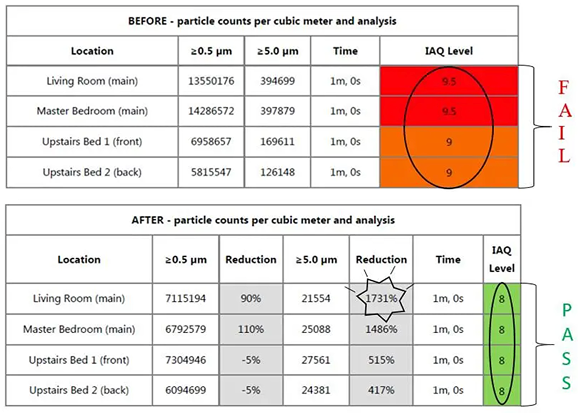Indoor Air Quality
At Certified Indoor Air, we pride ourselves on the high-quality indoor air quality (IAQ) particle testing services we provide. Our Western Washington customers trust us for our thorough and affordable IAQ testing, which can yield same-day report results. Indoor air quality can have a big effect on your health. Studies show people spend anywhere from 65-90% of their time indoors, and indoor air can be 2 to 5 times more polluted than outdoor air. The young, elderly, chronically ill, and those with respiratory or cardiovascular disease are often the most impacted by poor indoor air quality.
Some of the more common culprits discovered in homes and businesses that could adversely affect indoor air quality are asbestos, carbon monoxide, fiberglass, formaldehyde, mercury, mold, pesticides, radon, and tobacco smoke. (NOTE: Certified Indoor Air does NOT test for/detect any of the above items except mold. Our IAQ testing is particle testing ONLY. Read below to learn more about mold species testing vs. particle testing.)
Particles in air BEFORE treatment
Particles in air AFTER treatment
If you’ve scheduled us for an IAQ test at your property, there are some things you need to know in preparation. Read through this PDF.
So, what is particle testing?
Certified Indoor Air uses IAQ Analytics to measure air quality and detect mold-related problems—giving you clear results you can act on.
Instead of testing mold species (which has no useful standards), we measure particles in your air against trusted ISO & WHO guidelines.
You’ll get a simple, easy-to-read report with clear pass/fail results for each area tested.
If elevated particle counts point to mold, we’ll treat it and bring your air quality back to normal.
Note: IAQ's are utilized to help find the issue, and or to varify proper completion of work. It is never the solution to the problem.
Indoor Air Quality Process
01
VISUAL INSPECTION AND PARTICLE COUNT SAMPLES
02
COMPREHENSIVE MULTI-PAGE REPORT FROM A 3RD PARTY LAB (IAQ ANALYTICS)
03
CUSTOMER RECEIVES THE TECHNICIAN’S ANALYSIS BASED ON VISUAL INSPECTION
Why choose Certified Indoor Air for indoor air quality testing?
CERTIFIED PROFESSIONALS
Goldmorr Master Technicians
FAST RESULTS
Our methods deliver fast, measurable outcomes
TRUSTED LEGACY
20+ years serving Western Washington
CLEAN, RESPECTFUL WORK
We treat every home like our own
How you can minimize the issue until we arrive
Tips & Tricks for Maintaining Indoor Air Quality
Ventilate smartly: Open windows and run exhaust fans to keep fresh air circulating, especially in kitchens and bathrooms.
Change filters: Replace HVAC or portable air filters if they’re clogged or overdue—it’s a quick way to reduce airborne particles.
Keep things clean: Wipe surfaces with a damp cloth (instead of dry dusting) to trap dust and allergens instead of stirring them into the air.
Customer Reviews
Frequently Asked Questions
-
IAQ Analytics is a patented system designed to report on particulates in the air. This method does not determine mold species; but speciation is not valuable information since there are no standards for acceptable or unacceptable levels of mold(s). Instead, your technician will take several particle count readings within your home, which are then referenced to an International Standards Organization (ISO) standard and in coordination with the World Health Organization (WHO) because particles in the air have actually been given limits.
-
Poor air quality can trigger allergies, asthma, and other health issues. Improving it helps you and your family breathe easier and live more comfortably.
-
The 5-micron (5.0 µm) sized particles are most relevant to mold; so, when these counts are elevated, this indicates you have a mold problem. The goal of any effective mold and air quality remediation protocol is to return your indoor environment to ideal living conditions. As a part of that process, IAQ Analytics allows us to determine your current condition indoors.





 Water Damage
Water Damage Mold Remediation
Mold Remediation High Speed Drying
High Speed Drying